|
|
The Holy Apostle James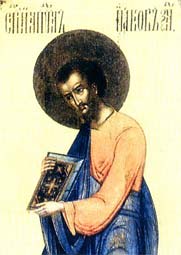 The son of Zebedee and brother of John, he was one of the Twelve. At the call of the Lord Jesus, he left his fishing nets and his father and, together with John, immediately followed Christ. He was one of the three apostles to whom the Lord revealed the greatest mysteries: before whom He was transfigured on Tabor and before whom He was in agony in the Garden of Gethsemane before His Passion. After receiving the Holy Spirit, he preached the Gospel in various places, going as far as Spain. On his return from Spain, a violent quarrel broke out between the Jews and himself on the Holy Scriptures, and, being unable to withstand him, they hired a magician, Hermogenes. But Hermogenes and Philip his pupil were overcome by the power and truth that James preached, and were baptised. Then the Jews denounced him to Herod, and persuaded one Josias to slander the Apostle. This Josias, seeing James's manly bearing and hearing his clear preaching of the truth, repented and came to faith in Christ. When James was condemned to death, this Josias was also condemned. Mounting the scaffold, Josias begged James's forgiveness for the sin of slander, and James embraced him, kissing him and saying: 'Peace be to thee, and forgiveness.' And they both laid their heads under the sword and were beheaded for the sake of the Lord whom they had loved and served. St James suffered in Jerusalem in the year 45. His body was taken to Spain, where to this day miracles of healing are performed at his tomb. The son of Zebedee and brother of John, he was one of the Twelve. At the call of the Lord Jesus, he left his fishing nets and his father and, together with John, immediately followed Christ. He was one of the three apostles to whom the Lord revealed the greatest mysteries: before whom He was transfigured on Tabor and before whom He was in agony in the Garden of Gethsemane before His Passion. After receiving the Holy Spirit, he preached the Gospel in various places, going as far as Spain. On his return from Spain, a violent quarrel broke out between the Jews and himself on the Holy Scriptures, and, being unable to withstand him, they hired a magician, Hermogenes. But Hermogenes and Philip his pupil were overcome by the power and truth that James preached, and were baptised. Then the Jews denounced him to Herod, and persuaded one Josias to slander the Apostle. This Josias, seeing James's manly bearing and hearing his clear preaching of the truth, repented and came to faith in Christ. When James was condemned to death, this Josias was also condemned. Mounting the scaffold, Josias begged James's forgiveness for the sin of slander, and James embraced him, kissing him and saying: 'Peace be to thee, and forgiveness.' And they both laid their heads under the sword and were beheaded for the sake of the Lord whom they had loved and served. St James suffered in Jerusalem in the year 45. His body was taken to Spain, where to this day miracles of healing are performed at his tomb.St Donatus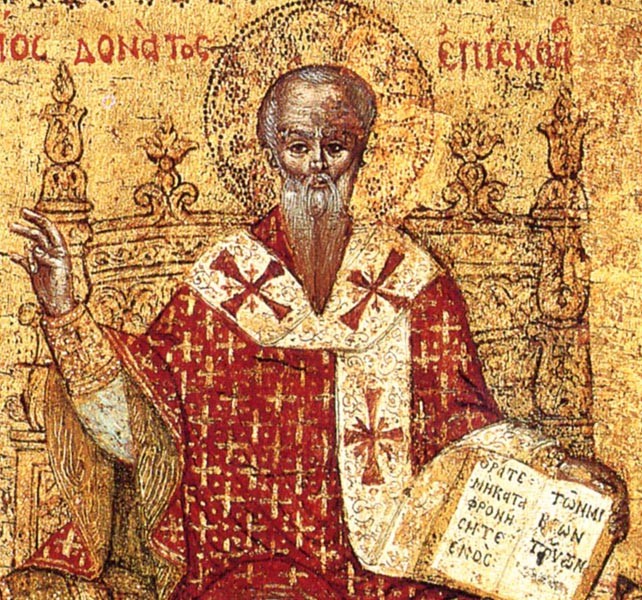 Bishop of Evria in Albania, he was endowed by God with great gifts of wonderworking, and performed many miracles for the sake of the people. He turned brackish water into sweet, brought rain in a drought, healed the king's daughter of insanity and raised a dead man. This dead man had paid off a debt to some creditor, but the unscrupulous creditor wanted the debt paid a second time, so he used the death of his debtor to come to the widow and demand that the debt be paid immediately. The widow wept and complained to the bishop. St Donatus told the creditor to wait until the man had been buried, then they would talk about the debt. But the creditor angrily demanded his own. Then Donatus went up to the corpse, took hold of it and cried: 'Get up, brother, and see what's up with this creditor of yours!' The corpse got up and, with a terrible gaze, looked at its creditor, telling him when and where it had paid the debt. It also demanded a written receipt from him. The terrified creditor gave the receipt into its hands. The corpse tore it up, then lay down again and died. St Donatus entered peacefully into rest in great old age, and went to the Lord in 387. His relics are still preserved for the help of the faithful in Evria in Albania. Bishop of Evria in Albania, he was endowed by God with great gifts of wonderworking, and performed many miracles for the sake of the people. He turned brackish water into sweet, brought rain in a drought, healed the king's daughter of insanity and raised a dead man. This dead man had paid off a debt to some creditor, but the unscrupulous creditor wanted the debt paid a second time, so he used the death of his debtor to come to the widow and demand that the debt be paid immediately. The widow wept and complained to the bishop. St Donatus told the creditor to wait until the man had been buried, then they would talk about the debt. But the creditor angrily demanded his own. Then Donatus went up to the corpse, took hold of it and cried: 'Get up, brother, and see what's up with this creditor of yours!' The corpse got up and, with a terrible gaze, looked at its creditor, telling him when and where it had paid the debt. It also demanded a written receipt from him. The terrified creditor gave the receipt into its hands. The corpse tore it up, then lay down again and died. St Donatus entered peacefully into rest in great old age, and went to the Lord in 387. His relics are still preserved for the help of the faithful in Evria in Albania.The Holy Martyr Argyra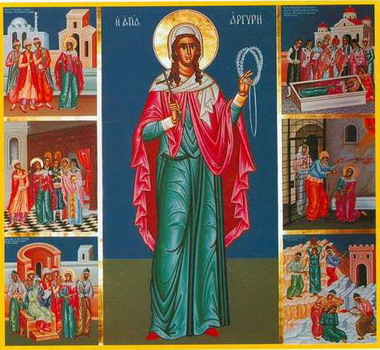 This new martyr was born in Brussa of devout parents. As soon as she was married to a Christian man, a Turk from the neighbourhood looked on her and invited her to live with him. The Christ-loving Argyra rejected the Turk's foul suggestion, and he was enraged and accused her to the judge of having intended to become a Moslem and afterwards retracted. From trial to trial, from prison to prison, St Argyra spent fifteen whole years suffering for Christ, for she loved Him more than anything in the world. She finally died in prison in Constantinople in 1725. This new martyr was born in Brussa of devout parents. As soon as she was married to a Christian man, a Turk from the neighbourhood looked on her and invited her to live with him. The Christ-loving Argyra rejected the Turk's foul suggestion, and he was enraged and accused her to the judge of having intended to become a Moslem and afterwards retracted. From trial to trial, from prison to prison, St Argyra spent fifteen whole years suffering for Christ, for she loved Him more than anything in the world. She finally died in prison in Constantinople in 1725.Martyr Maximus of Ephesus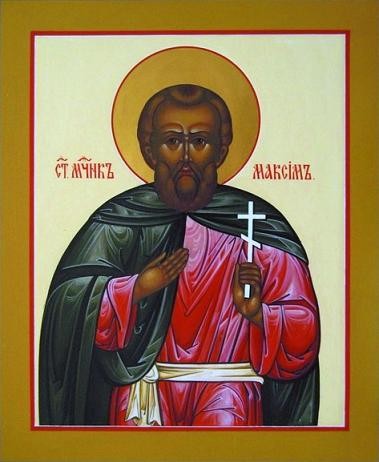 The Holy Martyr Maximos suffered for his faith in Christ and was run through the chest with a sword. The Holy Martyr Maximos suffered for his faith in Christ and was run through the chest with a sword.Uncovering of the relics of Hieromartyr Basil, bishop of Amasea (322)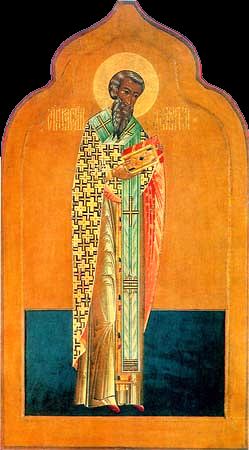 The PriestMartyr Basil, Bishop of Amasea, lived at the beginning of the IV Century in the Pontine city of Amasea. He encouraged and comforted the Christians, suffering persecution by the pagans. During this time the Eastern part of the Roman empire was ruled by Licinius (312-324), a relative by marriage to the holy Equal-to-the-Apostles emperor Constantine the Great (306-337, Comm. 21 May). Licinius deceitfully undersigned Constantine's "Edict of Religious Toleration" (313), which permitted the freely open confession of Christianity, but at heart he hated Christians and continued to persecute them to return to paganism... The PriestMartyr Basil, Bishop of Amasea, lived at the beginning of the IV Century in the Pontine city of Amasea. He encouraged and comforted the Christians, suffering persecution by the pagans. During this time the Eastern part of the Roman empire was ruled by Licinius (312-324), a relative by marriage to the holy Equal-to-the-Apostles emperor Constantine the Great (306-337, Comm. 21 May). Licinius deceitfully undersigned Constantine's "Edict of Religious Toleration" (313), which permitted the freely open confession of Christianity, but at heart he hated Christians and continued to persecute them to return to paganism...Venerable Clement the Hymnographer(9th c.)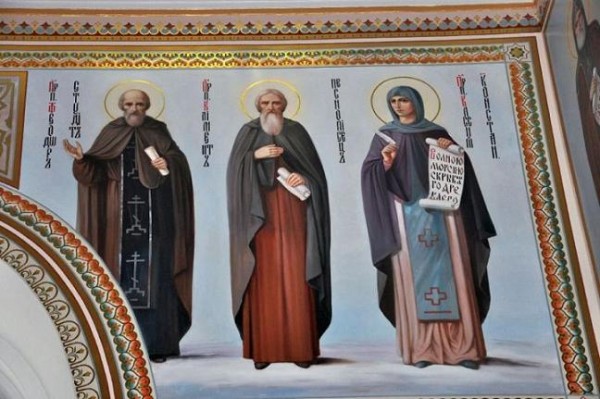 The Monk Clement the Writer of Churchly Song was hegumen of the Studite monastery after Saint Nicholas (+ 868, Comm. 4 February). Known as a zealous defender of Christianity, the confessor of icon-veneration also composed Canons of the Mother of God and to certain of the Saints, – in particular troparia to the Mother of God, Canons of the Seven Youths of Ephesus (Comm. 4 August), the Prophet and God-Seer Moses (Comm. 4 September), the Archangels (Comm. 8 November), and the Sunday before the Nativity of Christ. The Monk Clement the Writer of Churchly Song was hegumen of the Studite monastery after Saint Nicholas (+ 868, Comm. 4 February). Known as a zealous defender of Christianity, the confessor of icon-veneration also composed Canons of the Mother of God and to certain of the Saints, – in particular troparia to the Mother of God, Canons of the Seven Youths of Ephesus (Comm. 4 August), the Prophet and God-Seer Moses (Comm. 4 September), the Archangels (Comm. 8 November), and the Sunday before the Nativity of Christ. |